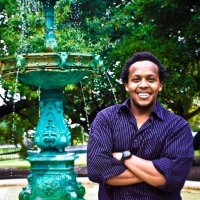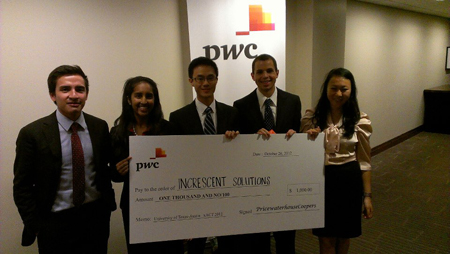 As the the Senior Communications Analyst and Social Media Manager for Dell, Kevin Curry is responsible for developing strategies to foster customer engagement and create brand awareness. He graduated from UT Austin in 2004 with degrees in BHP, Management Information Systems and Hispanic Studies. Kevin then went on to receive a master’s degree in Strategic Management and Political Advocacy & Leadership from the Harvard Kennedy School.
As the the Senior Communications Analyst and Social Media Manager for Dell, Kevin Curry is responsible for developing strategies to foster customer engagement and create brand awareness. He graduated from UT Austin in 2004 with degrees in BHP, Management Information Systems and Hispanic Studies. Kevin then went on to receive a master’s degree in Strategic Management and Political Advocacy & Leadership from the Harvard Kennedy School.
Tell me about your career path.
I received an offer upon graduation from Accenture, but I wasn’t sure I wanted to go down that path. I turned them down to go to Ecuador to work on my thesis and work with Rotary International. It was during that time that I really fell in love with humanitarian work. I was offered a job with the Secretary of State in Bolivia, but my dad got sick, so I declined that offer and returned to Dallas to be with him and help support my family. I ended up landing a job with KPMG in their IT consulting practice. I was with them for two years and during that time, I started a non-profit at my high school for mentoring, called Common Horizons. I quickly noticed synergies that existed between public-private partnerships and how applicable my business skill sets were to the nonprofit sector.
So, I decided I wanted to pursue a master’s degree, so I took a break from full-time employment and went to study at the Harvard Kennedy School. Upon graduation I spent a few months with a law firm called Shea & Larocque, in Boston working on an FBI drug case which got me interested in city government. An opportunity came up for the city of Dallas to work as a Management Development Associate Fellow for the City Manager’s Office and I went there for a year-and-a-half and worked in the Office of Cultural Affairs. Primarily, I created strategies to reduce energy consumption across Dallas’ various arts facilities and museums as part of that position. During that time, I was recruited by a group to help market a new type of hat to the hip hop community, which did very well, and helped me hone my product marketing skills. I was then recruited to Dell to work for their Services division in a newly-created social media marketing position.
Why did you decide to pursue a master’s degree in strategic management and political advocacy & leadership?
When I started up Common Horizons, I realized there was a synergy between public and private partnerships. Consulting strategy is about learning to be creative in resource-lacking environments. I knew the business side from my time in BHP, but I didn’t know much about public policy, advocacy and leadership across different cultures.
Do you have any advice for current students who may be considering applying to grad school?
Students should make sure a master’s degree is something they want to do and actually need. Look at your career path and think about what you want to do and determine if a master’s degree is the right path to get you there. I would also highly recommend waiting two to five years after you earn your undergraduate degree to make your decision. It is a big financial and time commitment. Plus, I find those who wait generally have more to contribute to class discussions and their appreciation for the material and experience is much greater.
Tell me more about what are you doing in your current role for Dell?
I work with the global communications team, but I also work in a marketing capacity. I come up with creative strategies to leverage social media and Internet technology to increase brand awareness and preference for several of the computer brands. Additionally, I work for Dell’s corporate social responsibility practice. I get to use some of the tools I learned while earning my master’s degree, like advocacy, which I really enjoy. For example, Dell is interested in giving back to the community and finding ways that technology can play a significant role. We act as advocates and partners for people who may be in environments where technology is not readily accessible and we help by donating technology and intellectual resources.
What skill sets are you using on a daily basis?
Communications and interpersonal skills can be undervalued, but they are super important. I have to interface with people around the globe constantly. Everything I do is global and I work with people from various cultures so understanding cultural nuances has been an integral part of success in my career. Analytical and problem-solving skills are also very important. Employers want you to add value right away. In my role, I had to think about what were the small, incremental changes I could make that would make an impact right from the start. Face it – starting out as an undergrad, you’re likely not going to get the opportunity to “crack the case” and help the company save millions of dollars. However, you will have the chance to provide support to the teams that will work on these projects by helping them get organized, offering appropriate suggestions on approach for small tasks and speaking up at the right moments during meetings – those are incremental impacts that will set you on the fast track in your career. Lastly, it is also very important to be able to think on your feet and answer questions as they come up.
Can you define what you consider to be successful branding?
Openness and fearlessness. A misperception that is out there is that companies create their own brand. Consumers actually create that brand. Companies need to be able to embrace what their consumers define their brand as and run with that. I think it is important to allow your customers to take your brand from you and tell you what it means. It isn’t about pushing messages out, it is about listening, and then creating stories around what you hear your customers saying about you. That is successful branding.
What role do you think social media plays in communicating with customers and strategically building a brand?
The most important role it plays is listening so that you understand customer needs and behavior and also, so that you see where your industry is heading. And you can easily engage in those conversations and do that through social media. You can also use it to mine for really good stories. Brands have a huge impact on people, but sadly many are not capitalizing on opportunities to leverage those stories to further promote their brand. Around 75% of customers say that they rely on customer feedback to make purchasing decisions. For the consumer, social media allows you to share your ideas and experiences around brands; and for the company, social media creates invaluable opportunities to amplify those stories and messages so that they can help other customers make similar purchasing decisions.
You started a nutrition blog called Fit Men Cook. Tell me more about that and why you enjoy blogging.
I really enjoy fitness and I wanted to share everything what I had been learning with others. In particular, I not only started FitMenCook.com to highlight the importance of diet in healthy weight loss and/or muscle gain, but also to demonstrate that eating healthy can be delicious, cost-effective and easy. It has done really well, much better than I thought it would. My Instagram Fitness account alone has over 100,000 followers. Vitamin brand supplement companies have reached out to market some of their products to the community of my followers, as have personal trainers. I started these accounts because I just loved to share and discuss this type of content. I found that when I started doing things I actually liked, creativity kicked-in and I found ways to make it sustainable and beneficial for me as well.
If you had it to do over again, is there anything you would have done differently as an undergrad?
I would have trusted my gut a little more to take on other majors that I would have really enjoyed. I wanted to be a math major in addition to BHP. Just know that being in majors you are really interested in can give you creative juice to create opportunities for yourself. Find that thing that keeps you up at night and do that. You will still have to do what pays the bills, but keep trying to figure out how to make that other “thing” more sustainable so you can end up doing what you love.



